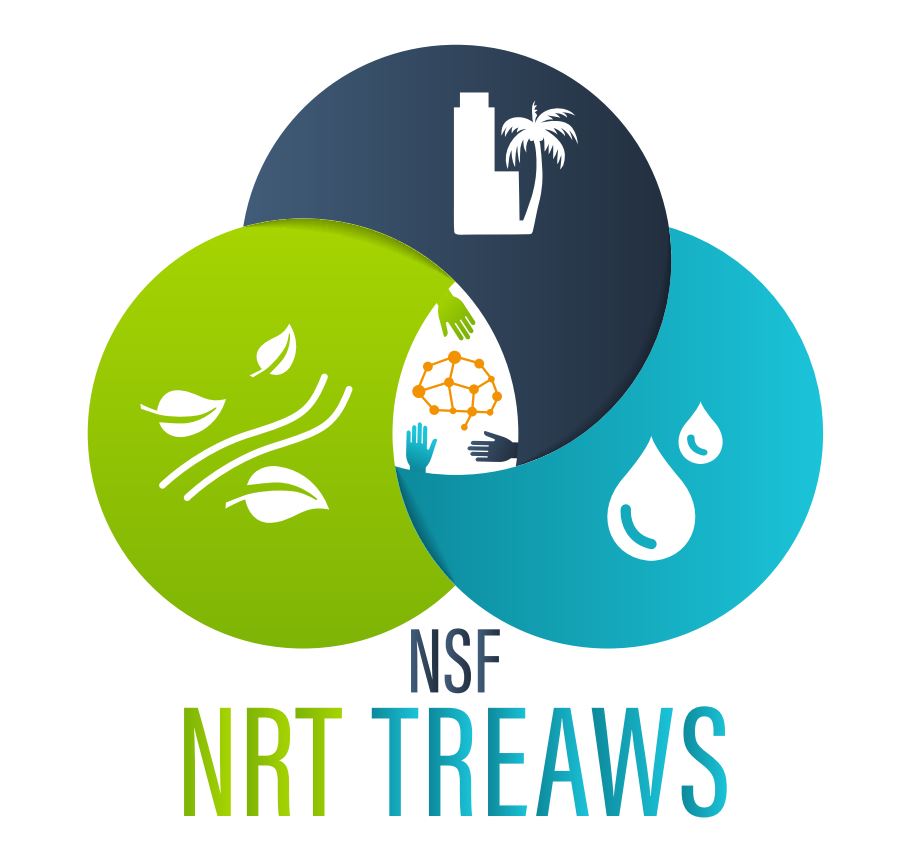NSF National Research Traineeship
NRT-HDR: Transdisciplinary Research and Education for Air and Water Resources Solutions in Coastal Communities (TREAWS)
This is a five-year project funded by National Science Foundation (NSF) National Research Traineeship (NRT) program with the award #2244523. You can find more information and updates from our project website: www.nrttreaws.org

Project Title: NRT-HDR: Transdisciplinary Research and Education for Air and Water Resources Solutions in Coastal Communities (TREAWS)
PI: Jianhong Ren
Co-PIs: David Ramirez, Hua Li, Tushar Sinha, Ari Sherris
Faculty Participants: Christine Robbins, David Hicks, Joel Cabrera, Marion Blake, Francisco Haces-Fernandez, Haibin Su, Robert Villa
Internal Evaluator: Liliana Rodriguez
External Evaluator: Michael Preuss
Project Summary:
Coastal communities face unprecedented environmental challenges such as frequent and intensified floods and droughts, uncertain availability of water resources, harmful algal blooms, and deteriorating water and air quality. Finding solutions to the management challenges associated with air and water resources is difficult due to complex social and environmental factors such as rapid population growth, industrial development, urbanization, and climate change. To effectively address these challenges, future environmental professionals, including engineers, scientists, policymakers, social scientists, and educators, must therefore have in-depth knowledge of the dynamic relationships between the natural, social, and engineering systems and an ability to transcend traditional disciplinary boundaries. This National Science Foundation Research Traineeship award to Texas A&M University-Kingsville will develop a new graduate training model to educate the next generation of environmental professionals with in-depth knowledge and skills to address coastal issues of environmental sustainability. The project will train seventy-eight (78) M.S. and Ph.D. students, including 24 NRT-funded trainees, from engineering, computer science, geosciences, agriculture science, environmental science, plant and soil science, education, and sociology.
The new graduate education model adopts a transdisciplinary approach to graduate training and convergence research that will inform effective air and water resources management. The NRT will focus on three research themes including: 1) coastal hydrology and flood prevention, 2) coastal water quality sustainability, and 3) coastal air quality management. The model developed by this program includes: 1) academic skills preparation via a new data science course, a webinar/seminar series, and transdisciplinary data-driven research to solve problems associated with air and water resources in the coastal regions; 2) professional skills development via a new lab course to enhance trainees? skills and competencies in communication, teamwork, ethics, and leadership; and 3) humanitarian service-learning experience to actively involve trainees in real-world experiences and collaborations with community stakeholders toward active solutions. Trainees will develop and synthesize skills in data science applications, transdisciplinary research, communication, teamwork, research ethics, and leadership. The project will design new interdisciplinary M.S. and Ph.D. tracks in Environmental Sustainability and Resilience with new curricular materials and frameworks so that other institutions can implement similar graduate education programs.
The NSF Research Traineeship (NRT) program is designed to encourage the development and implementation of bold, new potentially transformative models for STEM graduate education training. The program is dedicated to effective training of STEM graduate students in high priority interdisciplinary or convergent research areas through comprehensive traineeship models that are innovative, evidence-based, and aligned with changing workforce and research needs.
This award reflects NSF's statutory mission and has been deemed worthy of support through evaluation using the Foundation's intellectual merit and broader impacts review criteria.
